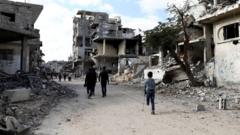Newly surfaced images illustrate the catastrophic impact the Israeli offensive has had on the region, particularly in northern Gaza, where the UN estimates that 60% of infrastructure has been compromised. Despite the cessation of bombings stirring celebrations among some, many Gazans face challenging conditions. Over two million individuals have been rendered homeless, relying almost entirely on food aid, which began trickling into the area immediately after the ceasefire with a record 630 lorries arriving within a single day.
The road to recovery is fraught with challenges, as Sam Rose from UNRWA stressed the multifaceted nature of rebuilding efforts that extend beyond immediate needs for food and health care to encompass emotional and social healing for individuals and communities battered by trauma. Meanwhile, families in Israel celebrated the return of three recently freed hostages, including Emily Damari, who conveyed a bittersweet sentiment recognizing the shared grief of other families still seeking loved ones missing in the conflict.
Palestinian health authorities report that over 46,900 lives have been lost, but challenges in accurately capturing the numbers persist. Medical studies suggest that the actual toll may well exceed 40% beyond the reported figures. The ramifications of the conflict have also severely impacted Gaza's Civil Defence staff, with substantial casualties among personnel and critical damage to operational resources.
As displaced Gazans cautiously return to their ravaged homes, the fear of renewed hostilities looms, bringing uncertainty to the fragile truce. With mutual apprehensions about the future of the ceasefire, Israeli officials have maintained their readiness to resume military actions if deemed necessary.
During a UN Security Council meeting, Secretary-General Antonio Guterres characterized the ceasefire as "a ray of hope", but cautioned that the situation in the occupied West Bank is deteriorating, compounding the ongoing humanitarian crisis. He highlighted concerns over potential annexation efforts by officials in Israel, which would contravene international law, further complicating the broad landscape of conflict amid hopes for resolution.
As Gazans embark on the arduous journey of healing and rebuilding, the profound scars left by the war remain a haunting reminder of the immense loss and suffering endured by the affected communities.
The road to recovery is fraught with challenges, as Sam Rose from UNRWA stressed the multifaceted nature of rebuilding efforts that extend beyond immediate needs for food and health care to encompass emotional and social healing for individuals and communities battered by trauma. Meanwhile, families in Israel celebrated the return of three recently freed hostages, including Emily Damari, who conveyed a bittersweet sentiment recognizing the shared grief of other families still seeking loved ones missing in the conflict.
Palestinian health authorities report that over 46,900 lives have been lost, but challenges in accurately capturing the numbers persist. Medical studies suggest that the actual toll may well exceed 40% beyond the reported figures. The ramifications of the conflict have also severely impacted Gaza's Civil Defence staff, with substantial casualties among personnel and critical damage to operational resources.
As displaced Gazans cautiously return to their ravaged homes, the fear of renewed hostilities looms, bringing uncertainty to the fragile truce. With mutual apprehensions about the future of the ceasefire, Israeli officials have maintained their readiness to resume military actions if deemed necessary.
During a UN Security Council meeting, Secretary-General Antonio Guterres characterized the ceasefire as "a ray of hope", but cautioned that the situation in the occupied West Bank is deteriorating, compounding the ongoing humanitarian crisis. He highlighted concerns over potential annexation efforts by officials in Israel, which would contravene international law, further complicating the broad landscape of conflict amid hopes for resolution.
As Gazans embark on the arduous journey of healing and rebuilding, the profound scars left by the war remain a haunting reminder of the immense loss and suffering endured by the affected communities.





















